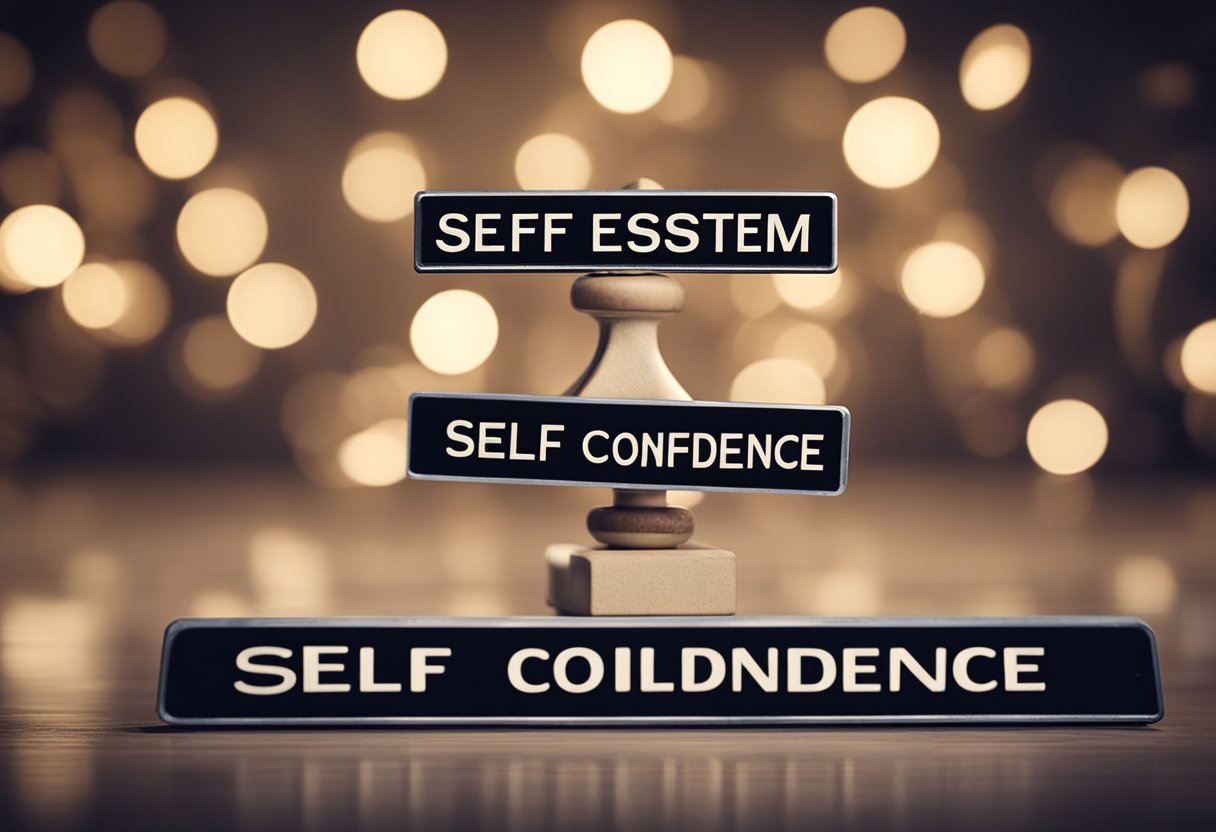Self-esteem and self-confidence are two concepts that are often used interchangeably, but they are not the same thing. Self-esteem is a person's overall sense of self-worth or personal value, whereas self-confidence is a belief in one's abilities and judgment. While they are related, having high self-esteem does not necessarily mean that a person has high self-confidence, and vice versa.

It is important to understand the differences between self-esteem and self-confidence, as they can have a significant impact on a person's mental and emotional well-being. Low self-esteem can lead to feelings of worthlessness, depression, and anxiety, while low self-confidence can result in missed opportunities and a lack of assertiveness. On the other hand, having healthy levels of both self-esteem and self-confidence can lead to greater happiness, success, and fulfillment in life.
While self-esteem and self-confidence are distinct concepts, they are also interconnected. For example, having high self-esteem can contribute to a person's sense of self-confidence, as they feel more secure in their abilities and worth. Conversely, building self-confidence through taking risks and achieving goals can also boost a person's self-esteem. Understanding the relationship between these two concepts and how to cultivate them can lead to a more fulfilling and satisfying life.
Related : https://www.my-ideaonline.com/2023/10/self-confidence-positive-affirmations.html
Understanding Self Esteem

Self-esteem is a crucial aspect of one's emotional and mental well-being. It refers to the value and worth one places on oneself. In other words, it is how much an individual loves and values themselves. Self-esteem is a long-term perspective on oneself, and it is not based on one's recent accomplishments or failures.
People with high self-esteem have a positive self-image, which leads to a sense of self-worth. They believe in their abilities and feel confident in their decisions. On the other hand, people with low self-esteem tend to have negative self-talk, which leads to self-doubt and self-criticism. They may feel like they are not good enough or that they do not deserve happiness or success.
Self-esteem can be influenced by various factors, such as upbringing, life experiences, and social interactions. For instance, a person who grows up in a nurturing environment with positive reinforcement is more likely to have high self-esteem. Conversely, a person who experiences trauma or abuse may have low self-esteem.
It is important to note that self-esteem is different from self-confidence. While self-esteem is about self-love and valuing oneself, self-confidence is about trust in one's own abilities and skills. Self-confidence can fluctuate depending on the situation, whereas self-esteem is a long-term perspective on oneself.
Overall, self-esteem plays a crucial role in one's emotional and mental well-being. It is important to cultivate a positive self-image and practice self-love to maintain healthy self-esteem.
Understanding Self Confidence

Self-confidence is the belief in one's own abilities, qualities, and judgment. It is the trust that one has in oneself to successfully perform a task or achieve a goal. Self-confidence is an essential component of personal and professional success, as it enables individuals to take risks, overcome obstacles, and pursue their goals with determination.
Self-confidence is often confused with self-esteem, but they are not the same. Self-esteem refers to one's overall sense of self-worth and value as a person, while self-confidence is specific to one's abilities and skills. A person can have high self-esteem but low self-confidence in a particular area, such as public speaking or playing a musical instrument.
Self-confidence is not something that people are born with; it is developed over time through experiences and feedback. Positive experiences and successes can boost self-confidence, while negative experiences and failures can decrease it. However, self-confidence is not fixed and can be improved with practice and effort.
To improve self-confidence, individuals can take several steps, including:
- Setting realistic goals and working towards them
- Focusing on their strengths and accomplishments
- Practicing and preparing for challenging situations
- Seeking feedback and learning from mistakes
- Surrounding themselves with supportive and encouraging people
It is important to note that self-confidence should not be confused with arrogance or overconfidence. Arrogance involves an exaggerated sense of self-importance and a lack of consideration for others, while overconfidence can lead to underestimating risks and overestimating one's abilities.
In summary, self-confidence is the belief in one's own abilities and skills, developed through experiences and feedback. It is an essential component of personal and professional success, but must be balanced with humility and awareness of one's limitations.
Differences Between Self Esteem and Self Confidence

Self-esteem and self-confidence are often used interchangeably, but they are different concepts. Self-esteem refers to how a person perceives their own value and self-worth, while self-confidence is a person's attitude about their capabilities and skills.
Self-esteem is a more general sense of how a person feels about themselves, and it can be influenced by a variety of factors, including their upbringing, experiences, and relationships. People with high self-esteem tend to have a positive view of themselves and their abilities. They are more likely to take risks and try new things, and they are less likely to be influenced by others' opinions.
On the other hand, self-confidence is more specific to a person's abilities and skills. It is the belief that one can successfully perform a particular task or achieve a specific goal. People with high self-confidence tend to be more assertive and proactive in pursuing their goals. They are more likely to take action and make decisions, even in the face of uncertainty or risk.
Another difference between self-esteem and self-confidence is that self-esteem is more stable over time, while self-confidence can fluctuate depending on the situation. For example, a person may have high self-confidence in their ability to give a presentation, but low self-confidence in their ability to play a musical instrument.
It is important to note that self-esteem and self-confidence are not mutually exclusive. In fact, they can reinforce each other. A person with high self-esteem is more likely to have high self-confidence, and vice versa.
In summary, while both self-esteem and self-confidence are important for personal well-being, they are different concepts. Self-esteem is a more general sense of self-worth, while self-confidence is more specific to a person's abilities and skills. People with high self-esteem tend to have a positive view of themselves, while people with high self-confidence tend to be more assertive and proactive in pursuing their goals.
The Interrelation of Self Esteem and Self Confidence

Self-esteem and self-confidence are two concepts that are often used interchangeably, but they are not the same. Self-esteem is the overall evaluation of one's worth and value as a person, while self-confidence is the belief in one's abilities, qualities, and judgment. Although they are distinct concepts, they are closely related and can influence each other.
Having high self-esteem can lead to increased self-confidence, as people who feel good about themselves are more likely to believe in their abilities and take risks. Conversely, having low self-esteem can lead to decreased self-confidence, as people who doubt their worth and value may be hesitant to take on new challenges or believe in their abilities.
Similarly, having high self-confidence can lead to increased self-esteem, as people who are successful and achieve their goals are more likely to feel good about themselves. Conversely, having low self-confidence can lead to decreased self-esteem, as people who struggle to achieve their goals or doubt their abilities may feel less valuable or worthy.
It's important to note that self-esteem and self-confidence are not fixed traits and can be developed and improved over time. By working on building self-esteem and self-confidence, individuals can improve their overall sense of well-being and achieve their goals.
In summary, while self-esteem and self-confidence are distinct concepts, they are closely related and can influence each other. By working on building both self-esteem and self-confidence, individuals can improve their overall sense of well-being and achieve their goals.
Impact of Self Esteem and Self Confidence on Personal Development

Self esteem and self confidence are two important aspects of personal development. While they are often used interchangeably, they are actually quite different.
Self esteem refers to a person's overall sense of self-worth and self-respect. It is the belief in one's own abilities and value as a person. A person with high self esteem is more likely to take risks, pursue their goals, and stand up for themselves when necessary.
On the other hand, self confidence is the belief in one's own abilities to accomplish a specific task or goal. It is the trust in oneself to perform well in a given situation. A person with high self confidence is more likely to take on new challenges and succeed in their endeavors.
Both self esteem and self confidence are important for personal development, and they can influence each other. For example, a person with high self esteem is more likely to have high self confidence, and vice versa.
Having a healthy level of both self esteem and self confidence can lead to many positive outcomes in life. For example, people with high self esteem and self confidence are more likely to:
- Be successful in their careers
- Have fulfilling relationships
- Be resilient in the face of adversity
- Take care of their physical and mental health
- Pursue their passions and hobbies
On the other hand, people with low self esteem and self confidence may struggle with these aspects of life. They may feel stuck in their careers, have difficulty forming healthy relationships, and struggle to take care of their physical and mental health.
It's important to note that self esteem and self confidence are not fixed traits. They can be developed and improved over time through various means, such as therapy, self-reflection, and positive self-talk.
In summary, self esteem and self confidence play important roles in personal development. While they are different, they both contribute to a person's overall sense of well-being and ability to succeed in life.
Ways to Boost Self Esteem and Self Confidence

Boosting self-esteem and self-confidence is essential for a person's mental well-being. Here are some ways to improve both:
1. Practice Self-Compassion and Kind Self-Talk
One of the best ways to boost self-esteem and self-confidence is to practice self-compassion. It involves treating oneself with kindness, understanding, and acceptance. Talking to oneself in a positive and kind manner can help build self-esteem and self-confidence.
2. Get Out of Your Comfort Zone
Doing something new and challenging can help build self-confidence. It can be as simple as trying a new activity or hobby or taking on a new responsibility at work. Stepping out of one's comfort zone can help build self-confidence by proving to oneself that they are capable of handling new situations.
3. Train Your Mindset to Focus on the Positives About Yourself
Focusing on one's strengths rather than weaknesses can help boost self-esteem. It involves training one's mindset to think positively about oneself and acknowledging one's accomplishments and achievements.
4. Seek Professional Support
Sometimes, boosting self-esteem and self-confidence requires professional help. A therapist or counselor can provide guidance and support to help a person work through their insecurities and build their self-esteem and self-confidence.
5. Reevaluate Your Friendships
Surrounding oneself with positive and supportive people can help boost self-esteem and self-confidence. Reevaluating one's friendships and letting go of toxic relationships can be beneficial for mental well-being.
6. Avoid Social Comparison on Social Media
Comparing oneself to others on social media can be detrimental to self-esteem and self-confidence. It is important to remember that people only show their highlight reels on social media and that everyone has their own struggles and insecurities.
7. Recognize Situations That Affect Self-Esteem
Recognizing situations that affect self-esteem can help a person prepare for them and minimize their impact. Common triggers might include a work or school presentation, a crisis at work or home, a challenge with a spouse, loved one, co-worker, or other close contact, or a change in roles or life events.
By following these tips and practicing self-compassion, anyone can improve their self-esteem and self-confidence.
Conclusion

In conclusion, self-esteem and self-confidence are two distinct but interrelated concepts that contribute to an individual's psychological well-being. While they share some similarities, they differ in their sources of validation and levels of stability.
Self-esteem refers to an individual's overall sense of self-worth and acceptance. It is deeply rooted in beliefs, emotions, and self-perception. On the other hand, self-confidence relates more specifically to an individual's belief in their abilities and competence to perform certain tasks or achieve particular goals.
While both self-esteem and self-confidence are important for personal growth and development, they are not interchangeable. A person can have high self-esteem but low self-confidence in certain situations, or vice versa. For example, someone may have high self-esteem but lack the confidence to speak in public.
It is important to note that self-esteem and self-confidence are not fixed traits and can be developed and improved over time with effort and practice. Building self-esteem and self-confidence can involve various strategies, such as setting achievable goals, challenging negative self-talk, practicing self-care, and seeking support from others.
Overall, understanding the differences between self-esteem and self-confidence can help individuals identify areas for personal growth and development and work towards building a more positive and fulfilling sense of self.


0 Commentaires